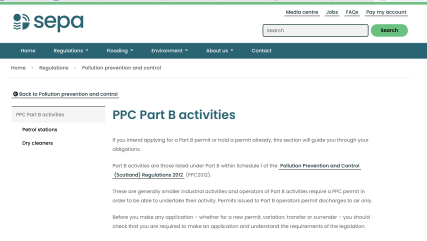
UK
If you are a drycleaner and you think you can ignore the legal requirement to acquire a permit for working with hazardous solvents, think again. Three Glasgow drycleaners have been issued civil penalties totalling £9,898 after failing to obtain permits for three separate premises by Scotland’s environmental regulator for operating without a Pollution Prevention and Control Permit.
The Variable Monetary Penalties (VMPs) were issued by the Scottish Environment Protection Agency (SEPA) to Bearsden Cross Drycleaners Ltd, Bothwell Kleen Ltd and Newton Mearns Drycleaners Ltd, companies all owned and operated by the same sole director, Bhupinder Singh Lalli.
On several occasions throughout the investigation, SEPA officers wrote to and visited all three companies stating the need for permits even leaving copies of application forms. However, the companies and Mr Singh Lalli repeatedly ignored SEPA’s advice. SEPA’s investigation established that the unauthorised drycleaning occurred at the three premises over a period of seven years at Bothwell Kleen and five years at both Bearsden Cross and Newton Mearns.
The following civil penalties have been served:
• Bothwell Kleen Ltd – £3,784.34
• Bearsden Cross Drycleaners Ltd – £3,057
• Newton Mearns Drycleaners Ltd – £3,057
In addition, SEPA issued notices to the three companies totalling £2,969.50 to partially recover the costs associated with the investigation.
Judith Moore, SEPA said:
“Drycleaners use solvents which can be hazardous to the environment and they require a permit from SEPA, stating the conditions which they must adhere with to ensure that hazardous waste is disposed of appropriately and emissions are controlled. This reduces the risk of harmful substances being released into the air, water and soil.
“Each of the companies, and their sole director, were all aware of the need to have permits but chose not to apply. In addition to the risk to the environment, these businesses have had an unfair advantage compared to other businesses who have applied, and paid for, the permits they need to operate. Compliance with authorised permit requirements is not optional and ignoring repeated attempts by SEPA officers to engage on the matter is unacceptable. These penalties should be a reminder that businesses must act responsibly and within the law, and those that don’t will face serious consequences.”
Civil penalties
VMPs are discretionary financial penalties which SEPA can impose for a relevant offence following an appropriate investigation. They sit alongside other enforcement tools available to SEPA staff, including advice and guidance, final warning letters, statutory enforcement notices, other civil penalties, including Fixed Monetary Penalties (FMPs) and reports to the Procurator Fiscal.
SEPA have determined that the total amount of the variable monetary penalties issued is £9,898.34 for these offences. SEPA’s enforcement action is designed to secure compliance with regulatory requirements, protecting and improving the environment. It aims to bring activity under regulatory control, stop offending, stop harm and/or reduce the risk of harm arising from non-compliance. It is also designed to ensure restoration or remediation of harm caused by regulatory non-compliance where appropriate.






